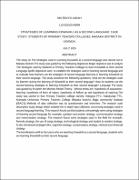| dc.description.abstract | The study on The Strategies used in Learning Kiswahili as a second language was carried out in Masaka District.The study was guided by the following objectives:Major objective was to analyse The Strategies used by Students in Primary Teachers Colleges to learn Kiswahili as their second Language.Spefic objectives were to establish the strategies used in learning second language,and to evaluate how learners use the strategies of second language learning in learning Kiswahili as their second language. The study answered the following questions; what are the strategies used by learners during the learning of Kiswahili as their second language? How do students use the second learning strategies in learning Kiswahili as their second language? Language The study was guided by Krashen the Monitor Model Theory. Whose tenets are: hypothesis of acquisitionlearning, hypothesis of form of nature, hypothesis of follow up and hypothesis of ceaiving.The study was carried in four Primary Teachers college namely: Ndegeya PTC, Kabukunge PTC, Kampala University Primary Teachers College (Masaka branch), Bajja community Institute {BACI}..Methods of data collection was by questionnaire and interview .The research used descriptive study design which enabled the in-depth data collection concerning strategies used in second language learning. This research found out that students unknowingly were using strategies of learning second language for example, question and answer strategy, communicative strategy and memorization strategy. The research found some strategies used in the field for example; formula strategy, the use of songs strategy, technological strategy and student to student strategy. It also introduced strategies like; cognitive strategy, compensatory strategy, retrieval and rehearsal strategy. The beneficiaries will be the tutors who are teaching Kiswahili as a second language, students who are learning Kiswahili as their second language. | en_US |

